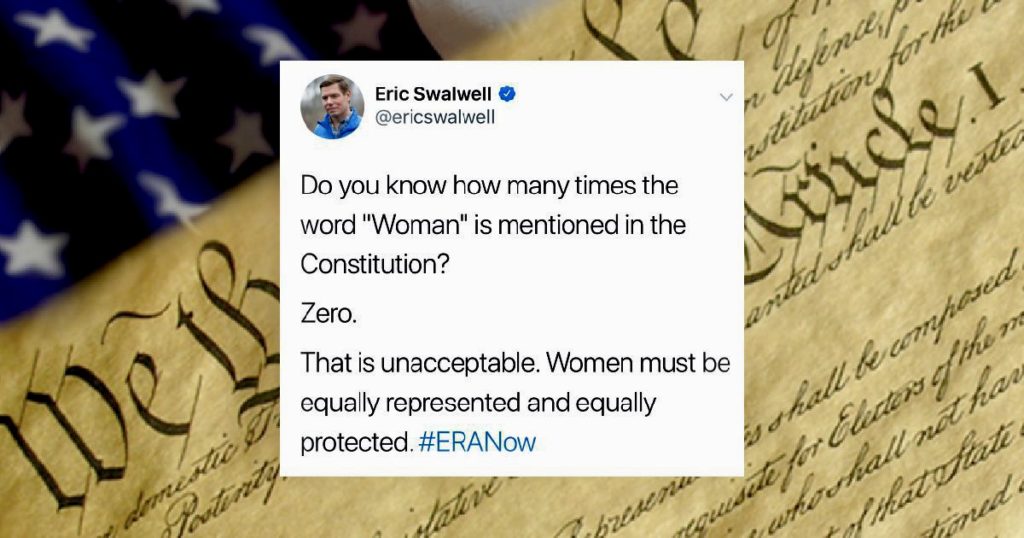Some Surprising Things About Sex and Slavery in the Constitution
California Congressman and previous 2020 Democratic hopeful Eric Swalwell and Rep. Ayanna Pressley (D-MA) took an oath to uphold the Constitution. Here’s the oath:
I do solemnly swear (or affirm) that I will support and defend the Constitution of the United States against all enemies, foreign and domestic; that I will bear true faith and allegiance to the same; that I take this obligation freely, without any mental reservation or purpose of evasion; and that I will well and faithfully discharge the duties of the office on which I am about to enter: So help me God.”How does a person swear to something that he or she doesn’t know what it says? Who would sign a contract without first reading it? I suspect that many members of Congress either don’t know what the Constitution says, or they don’t care, otherwise we wouldn’t have so many unconstitutional programs costing trillions of dollars. Do you know that the word “education” is not found in the Constitution? This means governing education is not one of the enumerated powers of the Federal government. The same can be said for healthcare and Social Security. Most members of Congress don’t broadcast their ignorance of the Constitution; they just vote their ignorance. Here’s latest bit of constitutional ignorance from Rep. Ayanna Pressley. Rep. Ayanna Pressley (D-MA) spoke on the House floor Wednesday [2.12.2020] in support of a bill to extend the expired deadline for states to ratify the controversial Equal Rights Amendment, claiming during her speech that women are still in “shackles” and that the “Constitution is sexist by its very design.” Rep. Swalwell is also a Democrat Representative from California and a failed Democrat presidential candidate. He wrote something similar:
Do you know how many times the word “Woman” is mentioned in the Constitution? Zero. That is unacceptable. Women must be equally represented and equally protected. #ERANow.

The right of citizens of the United States to vote shall not be denied or abridged by the United States or by any State on account of sex. Congress shall have power to enforce this article by appropriate legislation.In addition, the Constitution does not use the words “race,” “slavery,” “slave,” “white,” “black.” Such omissions are curious since there are many people who consider the Constitution also to be racist. The word “slavery” did not enter the Constitution until after the Civil War in the Thirteenth Amendment.
Section 1. Neither slavery nor involuntary servitude, except as a punishment for crime whereof the party shall have been duly convicted, shall exist within the United States, or any place subject to their jurisdiction.The supposed racist intent of the Constitution is seen in the “three-fifths clause” found in Article I, section 2, clause 3. Contrary to what some historians claim, the “three-fifths clause” is a clear indication that many of our constitutional founders wanted to end slavery through the legislative process. The three-fifths clause is not about personhood, that is, describing blacks as three-fifths of a white person. The Northern states did not want to count slaves for determining the number of representatives a state would have. The Southern states hoped to include slaves in the enumeration to acquire additional representation and voting strength in Congress. The compromise was to count slaves (although the word is never used) as “three-fifths” of a person for representation purposes. The fewer slaves counted, the fewer number of representatives and the less legislative power the slave states would have. There’s nothing new in this strategy. Today’s Democrats want to count non-citizens to bolster their legislative powers and give them the right to vote.
The goal of the Northern delegates was to dilute Southern voting strength to outlaw slavery by constitutional means. “The struggle that took place in the convention was between the Southern delegates trying to strengthen the constitutional supports for slavery and the Northern delegates trying to weaken them.”1If none of the slaves had been included in the population count for representation, as Northern delegates wanted, the slave states would have had only 41 percent of the seats in the House. If all the slaves had been included, as the pro-slave states wanted, the slave states would have had 50 percent of the seats. By agreeing to count slaves as three-fifths of a person for representation purposes, the slaveholding states ended up with a minority voting position—47 percent. Robert L. Goldwin concludes:
[T]he point is that the “three-fifths clause” had nothing at all to do with measuring the human worth of blacks. Northern delegates did not want black slaves included, not because they thought them unworthy of being counted, but because they wanted to weaken the slaveholding power in Congress. Southern delegates wanted every slave to count “equally with the Whites,” not because they wanted to proclaim that black slaves were human beings on an equal footing with free white persons, but because they wanted to increase the pro-slavery voting power in Congress. The humanity of blacks was not the subject of the three-fifths clause; voting power in Congress was the subject.2Members of Congress take an oath to uphold the Constitution. How can they do this if they don’t know what the Constitution says?



